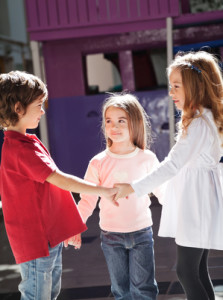Joanne Hanson, MS, CCC-SLP helps us understand why pragmatic language skills are necessary for social skills.
 Pragmatic Language
Pragmatic Language
Reading facial expressions, staying on the subject, joining in, developing ideas, and taking turns are as important for communication as articulation and vocabulary.
Children who have not mastered these pragmatic language find the playground to be a sensory nightmare, a social challenge, and a psychologically bewildering experience.
Pragmatic language delays also impact most academic skills.
Build these skills for youngsters age three to twelve with the activities below.
Activities for Working on Social and Pragmatic Language
Joining In
Free time, blocks, and playground were no fun for Michael. He didn’t know how to join a group. In therapy we “played” some typical playground games with Little People dolls, acting out several scenarios of “Duck Duck Goose.”
First the group began to play. Then new Little People came along wanting to join. We gave them a “script” for entering a game: “Hi, can I play with you?”
Within this structure, Michael had direction and safety. In his next few sessions we added to the dialogue and play scheme.
Soon after that Michael began to enjoy recess games.
Taking Turns
Set up a pretend slide and put little dolls on the floor with it. Encourage the child to speak for the dolls, to use appropriate words and ask questions. Then have the dolls argue about who goes first down the slide, finally deciding with “eeny meeny miney mo”. Do the same thing for the water fountain and pencil sharpener.
Developing Ideas
At the block center, Scott just pulls blocks off the shelf and lines them up. He needs to learn to picture an idea in his mind, then act on it.
Near the blocks put up pictures of airports, bridges, skyscrapers or other structures. Then before block time, talk to Scott about what he is going to make and how it will look.
Eventually, you want him to have an idea and be able to enter a group of children, explain his idea and execute it with the group.
Facial Expression
Model various facial expressions for children and have them guess how you feel: Happy, sad, surprised, scared?
What kind of news might make you look that way?
From a selection of sentences have them choose the one that expresses that kind of news:
- “Here’s a present for you!”
- “My cat is really sick.”
- “Our dog had eleven puppies!”
- “The teacher is giving us a surprise test!”
Staying on the Subject
“My grandfather gave me a rocket,” says Jeff, proudly. Emily smiles and responds, “I’m seven.” Telephone play is a great way to practice staying on a subject.
Give two peers a set of phones and have one pretend to call the other with news. The two children need to stay on their topic and keep the conversation going for at least 5 exchanges such as:
“I got a puppy”
“What is his name?”
“His name is Barley”
“What color is he?”
“He is yellow”….
Social Situations
Games like hide and seek are easy to act out using little dolls on the floor. Dolls and puppets are also useful when children are anxious about an upcoming event.
Play acting the first day of school, a birthday party, or giving a speech can alleviate anxiety and boost confidence.
For more practice, set up situations where two children need to talk, make eye contact, address each other by name, and encourage each other.
When making play dough, for example, give some of the ingredients to each child. They will have to communicate to get the end product.
Participating in Group Activities
Kids loosen up with puppets or dress-up. Take advantage of those occasions to practice pragmatics. Role play fits easily into thematic units.
When the classroom becomes a grocery store during the food unit, a child can practice a script with appropriate language for a shopper or clerk. Then, at playtime she is better prepared and feels more confident.
Good games for improving pragmatic language are Kids on Stage, Pizza Topple, Show and Tell Game, and Guess Who, as well as old standbys like Red Rover, blocks, guessing games, and sports.
Children who learn good pragmatic language and practice it in safe, structured, and enjoyable activities at home or in therapy are often able to generalize their new skills to other situations.
School and playground then become the sources of excitement and pleasure they are meant to be.
Still Looking for Answers?
Visit the Epidemic Answers Provider Directory to find a practitioner near you.
Related Pages
Choline and Complex Language Development
Sensory Processing Disorder and Social Interaction
Social Stories for Autism, ADHD and PDD-NOS
